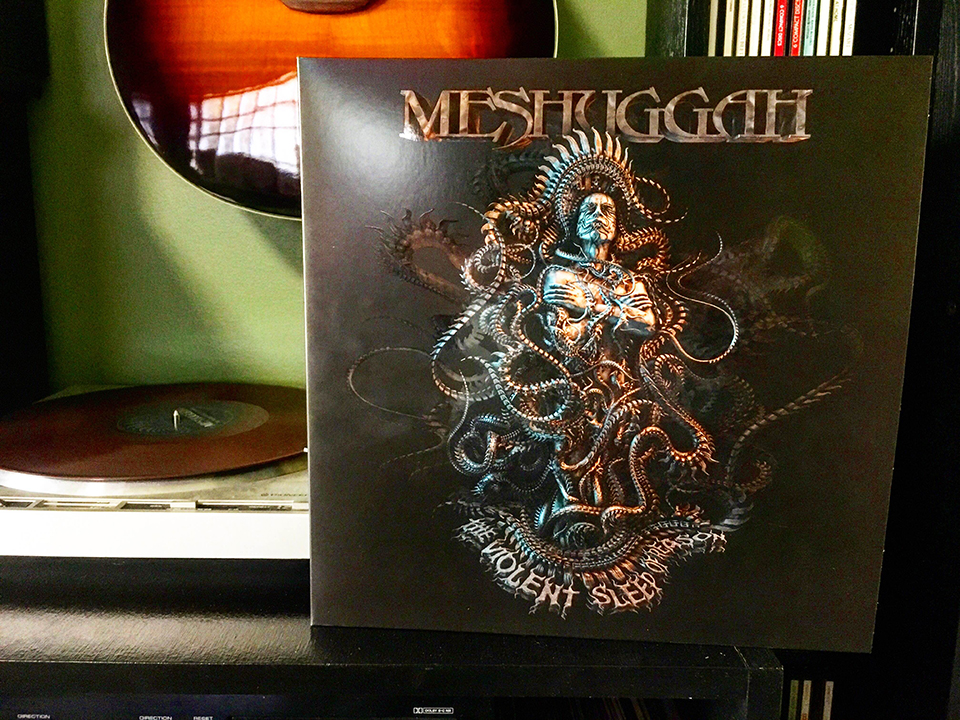Meshuggah’s influence on the music community defies quantification. Their guitar tone alone provided the foundation for the djent movement. While the band’s unrelenting groove, polyrhythmic sensibilities and menacing aura have earned them a place in any discussion of modern extreme metal, “The Violent Sleep of Reason” proves their story is far from over.
A Timeless Sound
On the surface, “The Violent Sleep of Reason” sounds like another Meshuggah album. A more critical listen unearths subtle discrepancies, but the most familiar facets of this album carry no less vitality. Their sound is simply timeless.
No Meshuggah clones exist simply because no band on the face of the planet can touch what Meshuggah spent the past 29 years building. They could have rehashed everything from their back catalogue and hold up just fine, but they instead continue meticulously constructing a ravenous behemoth of sonic decimation. This constant striving will continue putting them at the forefront of progressive music, as exemplified by these 10 tracks.
Staggering Technicality
Putting it simply, this album adds just enough of the staggering technicality of 2008’s “Obzen” to the primal “Koloss,” released four years ago. Meshuggah retains the best aspects of their most primitive and technical leanings, resulting in the truest encapsulation of what makes them one of metal’s most vital bands.
If the album’s title does not clarify this enough, Meshuggah revels in paradoxes. “The Violent Sleep of Reason” continues juxtaposing accessible groove and mind-blowing musical chops. Every track has undeniably catchy arrangements, but all of them sport incomprehensibly complicated foundations.
While tracks like “Monstrocity” and “Born in Dissonance” hide intricacy behind immovable structure, the title track and “Ivory Tower” exemplify Meshuggah’s dominance of rhythmic overdrive. The most difficult tracks on this album feel just as organic as the most palatable ones, hypnotizing the listeners with an ever-evolving assault.
Fluid Energy
Using live takes of each song, Meshuggah forsook studio trickery for fluidly energetic, unedited recordings of accomplished musicians vibing off of each other. This album exceeds most people’s threshold of technicality while simultaneously sounding exponentially tighter than many practitioners who resort to programmed instruments, speaking volumes about their unbelievable skill.
Whether the ridiculously challenging “Nostrum” — complete with one of the best guitar solos of this decade — or the atmospheric “Into Decay” take precedence, Meshuggah’s compositional prowess reaches critical mass. Tomas Haake’s drum hits effortlessly coincide with the filthy guitar chugs of Fredrik Thordendal and Mårten Hagström, while Jens Kidman’s feral barks punctuate the resulting juggernaut. While most modern metal bands center their writing around crowd-pleasing breakdowns, Meshuggah batters listeners into a trance by essentially writing a 58-minute breakdown. It never gets boring.
Meshuggah’s guitar tone remains one of their biggest claims to fame. It becomes an instrument in its own right. The bottom string chugs of “Stifled” feel more like detonating depth charges than notes, while Dick Lövgren’s complementary bass rumbles resemble animalistic growls. Lost of people can pick up an eight-string guitar and play a heavy breakdown, but Meshuggah’s music feels physically weighty. The drop 30 seconds into the aptly titled “By The Ton” needs no build-up, as seismic qualities literally extrude from every track on this album.
“The Violent Sleep of Reason” will not only go down as the crowning jewel of Meshuggah’s musical exploration, but one of the best metal albums of this decade. Whether they will top themselves again will remain a mystery until their next album drops, but until then their latest release stands as their finest work.







